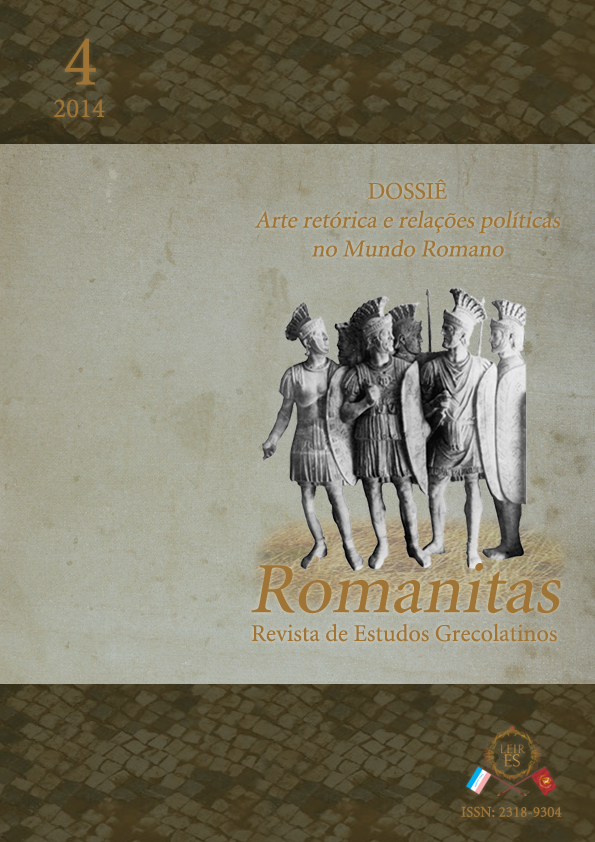Uma análise sobre o transcrito público do imperador Marco Aurélio Carino (282-285 d.C.)
DOI:
https://doi.org/10.17648/rom.v0i4.9205Palavras-chave:
Carino, Transcrito público, Poder, LegitimidadeResumo
Neste artigo, temos por objetivo analisar a representação do poder do imperador romano Marco Aurélio Carino (282-285) a partir do referencial teórico do transcrito público, tal como proposto pelo antropólogo americano James C. Scott, no livro Domination and the arts of resistance: hidden transcripts. A análise do transcrito público de Carino nos permitirá, não obstante, discutir os fatores que caracterizaram o poder imperial romano durante o século III, como a importância conferida às relações familiares e ao apoio das divindades como fatores de legitimação do poder.Downloads
Referências
Documentação primária impressa
AURELIO VICTOR. De Caesaribus. Translated by H.W. Bird. Liverpool: Liverpool Press, 1994.
FLAVIO EUTROPIO. Breuiarium. Translated by H.W. Bird. Liverpool: Liverpool University Press, 1993.
FESTUS. Breviarium. Translated by Thomas M. Banchich & Jennifer A. Meka. Buffalo, NY: Canisius College, 2001.
GEORGIUS CEDRENUS. Compendium Historiarum. Tr. Immanuele Bekkero. Bonnae: Impensis Ed. Weberi, 1838 (Corpus Scriptorum Historiae Byzantinae).
GEORGIUS SYNCELLUS. Cronografiae. Tr. Guilielmus Dindorfius. Bonnae: Impensis Ed. Weberi, 1829 (Corpus Scriptorum Historiae Byzantinae).
JEROME. Chronicle. Translated by Malcolm D. Donalson. In. SCHAFF, P. & WACE, H. (Ed.). A select library of Nicene and Post-Nicene Fathers of the Christian Church. Edinburgh: T&T Clark, 1896. t. V-1.
MALALAS. Chronographia. Tr. Ludovicus Dindorfius. Bonnae: Impensis Ed. Weberi, 1831 (Corpus Scriptorum Historiae Byzantinae).
PSEUDO-AURELIUS VICTOR. Epitome De Caesaribus. Translated by Thomas M. Banchich. Buffalo, NY: Canisius College, 2001.
SIDONIUS APOLLINARIUS EPISCOPUS. Carmina. In: MIGNE, J. P. Patrologia Latina. Paris, 1865. v. LVI.
ZONARAS. The History of Zonaras. Translated by Thomas M. Banchich & Eugene N. Lane. London: Routledge, 2012.
ZOSIMO. Historia Nueva. Traducción de José M. Candau Morón. Madrid: Gredos: 1992.
Documentação de cultura material
DESSAU, H. Inscriptiones Latinae Selectae. Berlim, 1892-1916.
WEBB, P. Probus to Ammandus. In: MATTINGLY, H.; SYDENHAM, E. A. The Roman imperial coinage. Londres: Spink & Son, 1933. v. V-2.
Obras de apoio
BARNES, T. D. Constantine and Eusebius. Cambridge: Harvard University Press, 1981.
CHARTIER, R. A história cultural: entre práticas e representações. Lisboa: Difel, 1990.
CHRISTOL, M. L’ Empire Romain du IIIe Siècle. Paris: Éditions Errance, 2006.
GONÇALVES, A. T. M. 'Funus Imperatorum': uma análise da cerimônia de apoteose do imperador Septímio Severo. Phoinix. v. 9, p. 25-36, 2003.
GONÇALVES, A. T. M. Uma análise da 'damnatio memoriae' de Geta. In: FUNARI, P. P. A.; SILVA, G. J. MARTINS, A. L. (Org.). História Antiga: contribuições brasileiras. São Paulo: Annablume, 2008, p. 115-128.
LEADBETTER, B. Galerius and the will of Diocletian. London: Routledge, 2009.
POTTER, D. S. The Roman Empire at bay: AD 180-395. London: Routledge, 2004.
PEACHIN, M. Roman imperial titulature and chronology (AD 235-285). Amsterdam: J.C. Gieben, 1990.
MENDES, N. M. O culto imperial como discurso de Romanização. Revista Maracanan, nº 9, p. 144-165, 2013.
PRICE, S. From noble funerals to divine cult: the consecration of Roman Emperors. In. CANNADINE, D. PRICE, S. (Ed.) Rituals of royalty. Cambridge: Cambridge University Press, p. 56-105, 1987.
SCOTT, J. C. Domination and the arts of resistance: hidden transcripts. New Haven: Yale University Press, 1990.
Downloads
Publicado
Edição
Seção
Licença
Copyright (c) 2015 Romanitas - Revista de Estudos Grecolatinos

Este trabalho está licenciado sob uma licença Creative Commons Attribution-NonCommercial-NoDerivatives 4.0 International License.
a. Os autores mantêm os direitos autorais e concedem à revista o direito de primeira publicação.
b. Os autores têm autorização para assumir contratos adicionais separadamente, para distribuição não-exclusiva da versão do trabalho publicada nesta revista (ex.: publicar em repositório institucional ou como capítulo de livro), com reconhecimento de autoria e publicação inicial nesta revista.
c. Autores têm permissão e são estimulados a publicar e distribuir seu trabalho online (ex.: em repositórios institucionais ou na sua página pessoal) após a primeira publicação pela revista, com os devidos créditos.
d. Os textos da revista estão licenciados com uma Licença CC BY 4.0 Deed Atribuição 4.0 Internacional (CC BY).

























